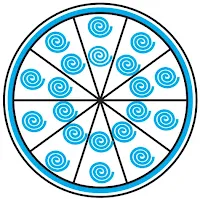The Biotic World is the best free Educational Website for Students. The Biotic World Provides NCERT Solution PDF, CBSE Notes PDF, NCERT Books PDF for class 8, 9, 10, 11, 12. The Biotic World also provides GU TDC Syllabus, Previous Years Question Papers, TDC notes on different topics of Physics, Chemistry, Mathematics, Zoology and Botany any many more.
So, Follow us to get tuned with latest updates.
Solution:
⇨ Given
d = 35 mm = 3.5 cm
r = 3.5/2 cm
(i) the total length of the silver wire required
= Perimeter of circle + 5 x Length of Diameter
(ii) The area of each sector of the brooch
= Area of Circle / Number of Sectors
Exercise 12.2
Tags:
Mathematics
